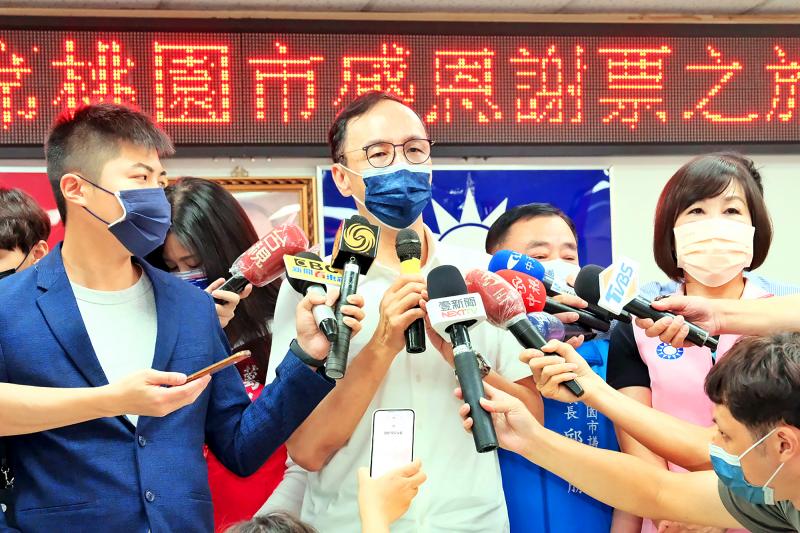Chinese Nationalist Party (KMT) chairman-elect Eric Chu (朱立倫) yesterday said he hopes the KMT and the Chinese Communist Party (CCP) will seek common ground and respect differences on the basis of the “1992 consensus” and opposition to Taiwanese independence.
Chu made the remarks in response to a congratulatory letter from Chinese President Xi Jinping (習近平) written in his capacity as general secretary of the CCP Central Committee on the occasion of Chu’s election as KMT chairman on Saturday.
In the recent past, the KMT and the CCP had good interactions, bolstered cooperation and promoted the peaceful development of cross-strait relations based on the common political basis of adhering to the “1992 consensus” and opposing Taiwanese independence, Xi said in his letter, according to a copy released by the KMT.

Photo: CNA
“At present, the situation in the Taiwan Strait is complex and grim,” Xi wrote, calling for unity among “all Zhonghua (中華) sons and daughters” and expressing the hope that the two parties will work together to “seek peace for the Taiwan Strait, seek reunification for the country and seek rejuvenation for the nation.”
For more than 30 years, there had been good progress in exchanges and cooperation at all levels of cross-strait relations due to the continued efforts of the KMT and the CCP, Chu said in his response, a copy provided by the KMT showed.
However, in the past few years, under the Democratic Progressive Party’s (DPP) administration, a “desinicization” and “anti-China” policy has been adopted, changing the “status quo” across the Strait, and resulting in a precarious situation and trepidation among people on both sides, he wrote.
Chu said he hopes that the KMT and the CCP will, on the basis of the “1992 consensus” and opposition to Taiwanese independence, seek common ground and respect differences, increase mutual trust, and bolster exchanges and cooperation so that the peaceful development of cross-strait relations can continue.
Chu is expected to be sworn in as KMT chairman on the same day as the party’s National Congress, which is scheduled to convene on Oct. 30, according to the KMT’s charter.
A two-term New Taipei City mayor, Chu won Saturday’s chairperson election with 85,164, or 45.78 percent, of the 186,018 valid votes cast by eligible KMT members, results released by the party’s Central Election Supervision Committee showed.
In January 2015, Chu was elected KMT chairman in an unopposed by-election, but he resigned one year later over the party’s losses in the Jan. 16, 2016, presidential and legislative elections, in which he was the KMT’s presidential candidate.
The “1992 consensus,” a term former Mainland Affairs Council chairman Su Chi (蘇起) in 2006 admitted making up in 2000, refers to a tacit understanding between the KMT and the Chinese government that both sides of the Taiwan Strait acknowledge there is “one China,” with each side having its own interpretation of what “China” means.

AIR SUPPORT: The Ministry of National Defense thanked the US for the delivery, adding that it was an indicator of the White House’s commitment to the Taiwan Relations Act Deputy Minister of National Defense Po Horng-huei (柏鴻輝) and Representative to the US Alexander Yui on Friday attended a delivery ceremony for the first of Taiwan’s long-awaited 66 F-16C/D Block 70 jets at a Lockheed Martin Corp factory in Greenville, South Carolina. “We are so proud to be the global home of the F-16 and to support Taiwan’s air defense capabilities,” US Representative William Timmons wrote on X, alongside a photograph of Taiwanese and US officials at the event. The F-16C/D Block 70 jets Taiwan ordered have the same capabilities as aircraft that had been upgraded to F-16Vs. The batch of Lockheed Martin

GRIDLOCK: The National Fire Agency’s Special Search and Rescue team is on standby to travel to the countries to help out with the rescue effort A powerful earthquake rocked Myanmar and neighboring Thailand yesterday, killing at least three people in Bangkok and burying dozens when a high-rise building under construction collapsed. Footage shared on social media from Myanmar’s second-largest city showed widespread destruction, raising fears that many were trapped under the rubble or killed. The magnitude 7.7 earthquake, with an epicenter near Mandalay in Myanmar, struck at midday and was followed by a strong magnitude 6.4 aftershock. The extent of death, injury and destruction — especially in Myanmar, which is embroiled in a civil war and where information is tightly controlled at the best of times —

China's military today said it began joint army, navy and rocket force exercises around Taiwan to "serve as a stern warning and powerful deterrent against Taiwanese independence," calling President William Lai (賴清德) a "parasite." The exercises come after Lai called Beijing a "foreign hostile force" last month. More than 10 Chinese military ships approached close to Taiwan's 24 nautical mile (44.4km) contiguous zone this morning and Taiwan sent its own warships to respond, two senior Taiwanese officials said. Taiwan has not yet detected any live fire by the Chinese military so far, one of the officials said. The drills took place after US Secretary

THUGGISH BEHAVIOR: Encouraging people to report independence supporters is another intimidation tactic that threatens cross-strait peace, the state department said China setting up an online system for reporting “Taiwanese independence” advocates is an “irresponsible and reprehensible” act, a US government spokesperson said on Friday. “China’s call for private individuals to report on alleged ‘persecution or suppression’ by supposed ‘Taiwan independence henchmen and accomplices’ is irresponsible and reprehensible,” an unnamed US Department of State spokesperson told the Central News Agency in an e-mail. The move is part of Beijing’s “intimidation campaign” against Taiwan and its supporters, and is “threatening free speech around the world, destabilizing the Indo-Pacific region, and deliberately eroding the cross-strait status quo,” the spokesperson said. The Chinese Communist Party’s “threats